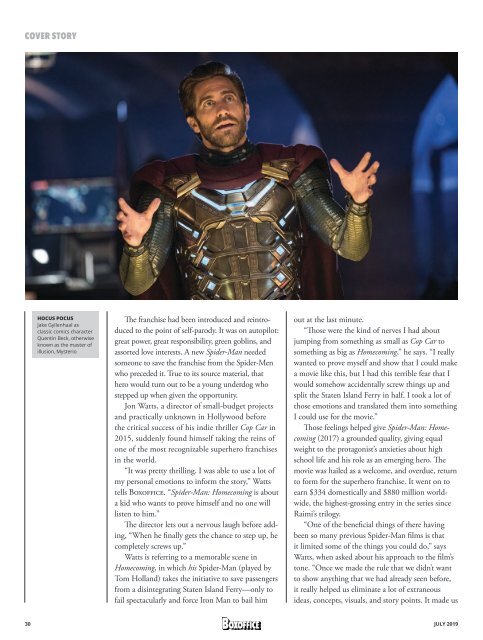Boxoffice - July 2019
The Official Magazine of the National Association of Theatre Owners
The Official Magazine of the National Association of Theatre Owners
You also want an ePaper? Increase the reach of your titles
YUMPU automatically turns print PDFs into web optimized ePapers that Google loves.
COVER STORY<br />
HOCUS POCUS<br />
Jake Gyllenhaal as<br />
classic comics character<br />
Quentin Beck, otherwise<br />
known as the master of<br />
illusion, Mysterio<br />
The franchise had been introduced and reintroduced<br />
to the point of self-parody. It was on autopilot:<br />
great power, great responsibility, green goblins, and<br />
assorted love interests. A new Spider-Man needed<br />
someone to save the franchise from the Spider-Men<br />
who preceded it. True to its source material, that<br />
hero would turn out to be a young underdog who<br />
stepped up when given the opportunity.<br />
Jon Watts, a director of small-budget projects<br />
and practically unknown in Hollywood before<br />
the critical success of his indie thriller Cop Car in<br />
2015, suddenly found himself taking the reins of<br />
one of the most recognizable superhero franchises<br />
in the world.<br />
“It was pretty thrilling. I was able to use a lot of<br />
my personal emotions to inform the story,” Watts<br />
tells <strong>Boxoffice</strong>. “Spider-Man: Homecoming is about<br />
a kid who wants to prove himself and no one will<br />
listen to him.”<br />
The director lets out a nervous laugh before adding,<br />
“When he finally gets the chance to step up, he<br />
completely screws up.”<br />
Watts is referring to a memorable scene in<br />
Homecoming, in which his Spider-Man (played by<br />
Tom Holland) takes the initiative to save passengers<br />
from a disintegrating Staten Island Ferry—only to<br />
fail spectacularly and force Iron Man to bail him<br />
out at the last minute.<br />
“Those were the kind of nerves I had about<br />
jumping from something as small as Cop Car to<br />
something as big as Homecoming,” he says. “I really<br />
wanted to prove myself and show that I could make<br />
a movie like this, but I had this terrible fear that I<br />
would somehow accidentally screw things up and<br />
split the Staten Island Ferry in half. I took a lot of<br />
those emotions and translated them into something<br />
I could use for the movie.”<br />
Those feelings helped give Spider-Man: Homecoming<br />
(2017) a grounded quality, giving equal<br />
weight to the protagonist’s anxieties about high<br />
school life and his role as an emerging hero. The<br />
movie was hailed as a welcome, and overdue, return<br />
to form for the superhero franchise. It went on to<br />
earn $334 domestically and $880 million worldwide,<br />
the highest-grossing entry in the series since<br />
Raimi’s trilogy.<br />
“One of the beneficial things of there having<br />
been so many previous Spider-Man films is that<br />
it limited some of the things you could do,” says<br />
Watts, when asked about his approach to the film’s<br />
tone. “Once we made the rule that we didn’t want<br />
to show anything that we had already seen before,<br />
it really helped us eliminate a lot of extraneous<br />
ideas, concepts, visuals, and story points. It made us<br />
30 JULY <strong>2019</strong>

















